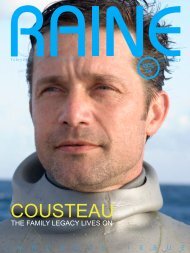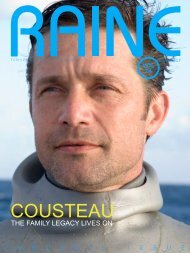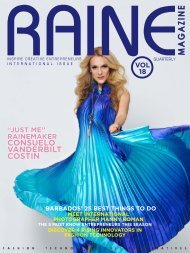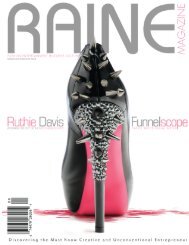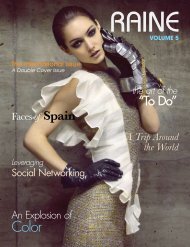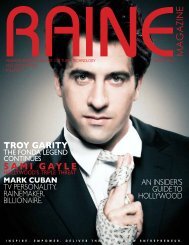RAINE MAGAZINE Volume 16 | Innovate
You also want an ePaper? Increase the reach of your titles
YUMPU automatically turns print PDFs into web optimized ePapers that Google loves.
<strong>RAINE</strong>MAKERS<br />
FROM WIRED TO WEB 2.0 TO TACKLING BIG DATA<br />
MEET THE ULTIMATE ENTREPRENUER<br />
JOHN BATTELLE<br />
By Nova Lorraine<br />
In our era of ultra-connectivity, one man stands out as a pioneer of<br />
Web 2.0. Entrepreneur John Battelle is best known for launching<br />
standout media properties such as Wired, The Industry Standard, and<br />
Federated Media Publishing: all now top-ranking online properties. His<br />
insights into emerging trends have made him a leader in all things web.<br />
Battelle co-founded and co-hosts the annual Web 2.0 Summit and his<br />
next book, WHAT WE HATH WROUGHT will give us a forecast of the<br />
interconnected world in 2040. Follow along as we learn more about this<br />
tech leader who is definitely ahead of his time.<br />
PART 1 - THE EARLY YEARS AND ENTREPRENEURISM<br />
<strong>RAINE</strong>: What was your first entrepreneurial moment in your childhood<br />
that you can reflect on?<br />
BATTELLE: When I was a kid, one of the things that I used to complain<br />
about with my friends in middle school was when our parents would<br />
have these cocktail parties, and they would ask us to help them. We<br />
would do whatever we could do to not be around. This was the early to<br />
mid 70’s. There was a circuit of these parties in our social set. My mom<br />
would complain that it was a lot of work, so my friends and I founded<br />
Parties Unlimited, and we catered these parties. I did the bar. I was<br />
12 years old. I made the business cards. I was the co-founder. I saw<br />
this as an opportunity to turn this negative into a positive. How were we<br />
going to get paid, and how were we going to scale it? Thirdly, we looked<br />
good in the eyes of our parents and it got us in the middle of the party.<br />
It was also pretty easy to steal a few drinks! I ran that for 2 to 3 years...<br />
until it became uncool to be doing that in high school.<br />
<strong>RAINE</strong>: Can you talk about your interest in technology as an artifact of<br />
who we are and what we do?<br />
BATTELLE: I’m obsessed with ad technology right now, not for the<br />
technology, for what I think it means underneath. The infrastructure of<br />
advertising technology is very complicated. It’s an open platform with all<br />
kinds of players from entrepreneurs to fraudsters. It’s 10 times the size<br />
of search engines, i.e. Google. It’s how our culture is going to interact<br />
with each other: through data. I’m studying it because it’s the next great<br />
artifact of our society. I’m interested in how to guide it. And what is the<br />
greatest artifact ever created so far? The Macintosh.<br />
<strong>RAINE</strong>: What was the catalyst for creating Web 2.0?<br />
BATTELLE: It was an idea. I wrote a piece while teaching at Berkley.<br />
I was working with a magazine called FOO, Friends of O’Reilly. One<br />
of us had this idea of bringing together a group of really cool people<br />
without any agenda. Something is happening, we thought- a second<br />
coming of the web. This was between 2003 and 2004. We decided<br />
to call this conference Web 2.O. It had a great run for a decade, but<br />
I ultimately made the decision to stop doing it because it had run its<br />
course, and it was time to do other things.<br />
<strong>RAINE</strong>: Are certain individuals destined to be entrepreneurs?<br />
BATTALLE: Entrepreneurism has become a job description in today’s<br />
world, and it’s simply not true. When I did Wired in the early 90s, the<br />
first truly crazy thing I’ve chosen to do; we had 300K and 11 people, and<br />
I was employee number 5 or 6. I took that job and was so in love with<br />
the idea and saw that I was going to be part of building something, and<br />
never thought about the consequences (e.g. no pay for 3 months). I<br />
never thought, ‘Oh, I’m going to be an entrepreneur now.’<br />
Now, everyone wants to leave business school or any school to be an<br />
entrepreneur. It’s like a kid leaving school early to be drafted, as if it is<br />
an understood path. It’s celebrated and its hyped. That wasn’t what I<br />
was. We go on this path, and we figure out what we are and are not<br />
good at and we re-examine it. It turns out that a lot of entrepreneurs stop<br />
running things, and then they become venture capitalists; they become<br />
the player under a coach or the coach that helps the player. After a<br />
couple of decades of starting stuff, you tend have a bit of reflection. I<br />
just can’t imagine not being in a start-up and had been working at a ‘real<br />
job’ instead. I am fortunate to have made a path, so far, in making new<br />
things as opposed to working on others’ in a large organization.<br />
A lot of people go through this process and fail. Maybe it’s not wise to<br />
for the press to glamorize this. There is a potential downside if you don’t<br />
go into it with your eyes wide open: lost relationships, health, time with<br />
kids, money, life…<br />
PART 2 - THE BOOK<br />
<strong>RAINE</strong>: Has the premise of your book changed since your announcement<br />
to write it, back in 2011?<br />
BATTELLE: It’s a difficult task to paint a picture of what the world could<br />
look like in 30 years. In terms of a premise and starting the narrative,<br />
I’ve figured out how to tell the story and I’ve identified a hero. The overarching<br />
premise is the same, but it’s still an active work in progress.<br />
<strong>RAINE</strong>: What are some scary or more concerning observations that will<br />
be highlighted in the book?<br />
BATTELLE: One: As we, as a society, become data-driven and begin<br />
to clothe ourselves with data about ourselves and our interaction with<br />
others - could be commercial, social or political interaction - as we<br />
create information about that, and as it is stored, analyzed and tracked,<br />
it is done on systems that we don’t have control over as individuals.<br />
It’s not the privacy issue. It’s far more about the individual and the<br />
organization and how that social contract is written about this new<br />
currency of information. I’m very interested in that piece of the puzzle.<br />
I don’t think many of us as readers have thought very deeply about that.<br />
We are entering a new era, and it’s extremely exciting the potential of all<br />
kinds of opportunities. But we have to think about who is in charge of<br />
this information. My concern is when we start adopting systems through<br />
60<br />
Raine Magazine - <strong>Volume</strong> 15




